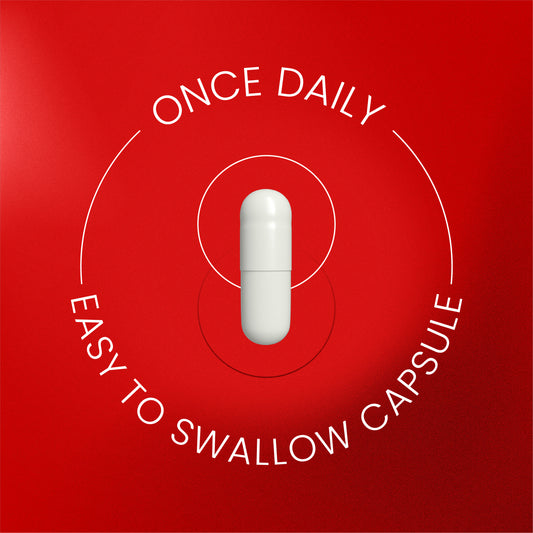

Your immune system is your biggest fan. All it wants is to protect you and keep you healthy. But like most relationships, it’s a two-way street. You need to take care of your immune system so it can keep taking care of you. If that balance is broken, your immune system will let you know with a series of warning symptoms.
By understanding the symptoms and what causes them, you can work towards a stronger, healthier immune system.
What is the role of a strong immune system?
Think of your immune system like your own personal bodyguard. It’s made up of cells, proteins, and organs that all work together to defend against invaders that could make you sick.
What exactly are these invaders? Most of them are pathogens—viruses, bacteria, fungi, and parasites that find their way into your body and cause disease. But they can also be internal threats, like cancer cells forming, or external substances, like toxins or poisons.
No matter what it is, your immune system’s job is to neutralize it and protect you from illness and disease.
What can cause a weak immune system?
Lack of sleep. When you’re sleeping, your body makes antibodies. These powerful cells fight infection and protect against illness. If you aren’t getting enough zzz’s, your immune system won’t have enough antibodies to keep you healthy.
Stress is a major trigger for your immune system too. In fact, just 30 minutes of anxiety can weaken your immune response.
Low levels of crucial vitamins and nutrients—specifically vitamin D, vitamin C, zinc, iron, and fiber—can slow down your immune function. That’s why colds are so common in the winter. The lack of sunlight (or simply spending time outdoors) can cause your vitamin levels to quickly fall below normal.
Poor diet. Your immune system loves when you eat a nutritious, well-balanced diet. Fiber, zinc, iron, and probiotics are especially important to support your gut, reduce inflammation, and keep your immune system happy. If you aren’t feeding your body the fuel it needs, your immune system can suffer.
Certain prescription medications can harm your immune system while they try to heal something else. Corticosteroids, TNF inhibitors, and drugs for IBS are just a few examples. Always talk to your doctor about side effects before taking a new medication.
Being unhealthy in excess. You know what we’re talking about—drinking too much alcohol, smoking cigarettes, eating processed foods. As much as we all hate to hear it, anything that doesn’t support your overall health can hurt your immune function.
What are the different symptoms of a weak immune system?
Low energy
Fighting off all those potential threats is a tiring job for your immune system. It needs a lot of energy to keep you healthy. And the weaker your immune system is, the more energy it needs to protect you.
That’s why your body conserves energy—so the immune system can use it when needed. But if your immune function is using up all the fuel, the rest of your body doesn’t have enough to do everything it needs to.
The result? Fatigue, weakness, and really wanting a nap. If you’re getting the recommended amount of sleep each night (7 to 9 hours) and you still feel tired, it’s a sign your immune system might need a little love.
Frequent illness and infection
Feel like you’re getting sick all the time? That’s typically the first and most obvious sign that your immune system isn’t as strong as it should be. The average US adult gets 2 to 3 colds per year. Any more than that and it’s time to check in on your immunity.
But colds aren’t the only red flag. A weak immune system can also cause frequent ear, sinus, or skin infections. Keep track of your symptoms and let your doctor know how often illness or infection is occurring.
High stress levels
Stress and your immune function go hand in hand. A weak immune system can be stressful, and stress can in turn damage your immune system. It’s like an endless cycle that feels tough to break once you’re in it.
How does it work? When your fight or flight response kicks in, it causes a drop in protein production, white blood cell production, and normal cell function. All of these changes impact the immune system.
Stomach pain
Indigestion? Abdominal pain? Nausea? Your immune system might be to blame.
Your gastrointestinal (GI) tract is an important player in keeping your immune system strong. It’s home to millions of bacteria that regulate the immune system. In other words, they help the immune system figure out which pathogens should stay and which should get the boot.
If that regulation process slows down, your GI tract will send you warning signs—like diarrhea, constipation, and bloating. Not fun.
Keep in mind: stomach troubles can also be a sign of autoimmune disease. That’s when your immune system is too active and is killing off good bacteria along with the bad. If you’re struggling with some tough tummy symptoms, talk to your doctor about what might be causing it.
How can you boost your immune system?
Good news: There are so many ways to strengthen your immune system and feel healthier. And most of them are simple-yet-powerful lifestyle and behaviour changes.
- Up your vitamin C intake: Eat more vitamin C-rich foods, like oranges or camu camu powder (perfect in smoothies). If needed you can take a daily supplement.
- Shift your diet: Fill your kitchen with more immune-boosting foods, like citrus fruits, greens, mushrooms, turmeric, and brazil nuts.
- Get your beauty sleep: Aim for at least 7 hours of quality shut-eye per night.
- Exercise regularly: Move your body often to improve sleep, reduce stress, and maintain a healthy body weight.
- Cut back on cigarettes and alcohol: Both can disrupt your gut microbiome and throw your immune system out of balance.
- Practice good hygiene to avoid illness: Wash your hands before and after meals, after blowing your nose, after using the washroom—you get the picture.
- Manage stress: Yoga, meditation, deep breathing, and spending time with the people you love are all great ways to soothe stress.
- Take high-quality supplements: Make sure you’re getting the right amount of vitamins and nutrients every single day. Vitamins C, D, A, E, zinc, fiber, beta-carotene, probiotics, and iron are all essential to maintaining a healthy immune system.
Take Ferosom Forte for example. This iron supplement has one of the highest absorption rates available. Why? It’s microencapsulated in Liposomal form and infused with vitamin C to boost absorption even higher.
The bioavailability of liposomal iron is 3.5 times greater than the free pyrophosphate iron, 2.7 times higher than iron sulfate, and 4.1 times higher compared with iron gluconate. In other words, this supplement is specifically designed for maximum absorption.
Best of all, Ferosom sachets are formulated with other vitamins, like Folic acid, vitamins D, C, B6, and B12. It’s like an immunity boost from multiple angles—in just one supplement. Click here to learn more.





